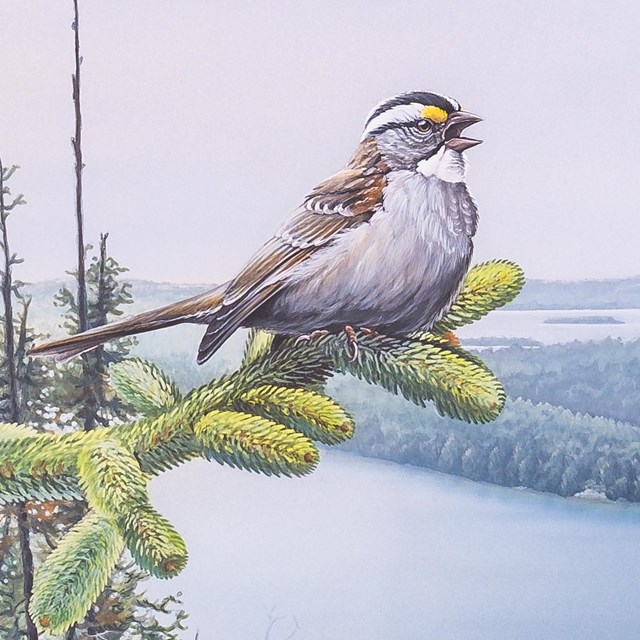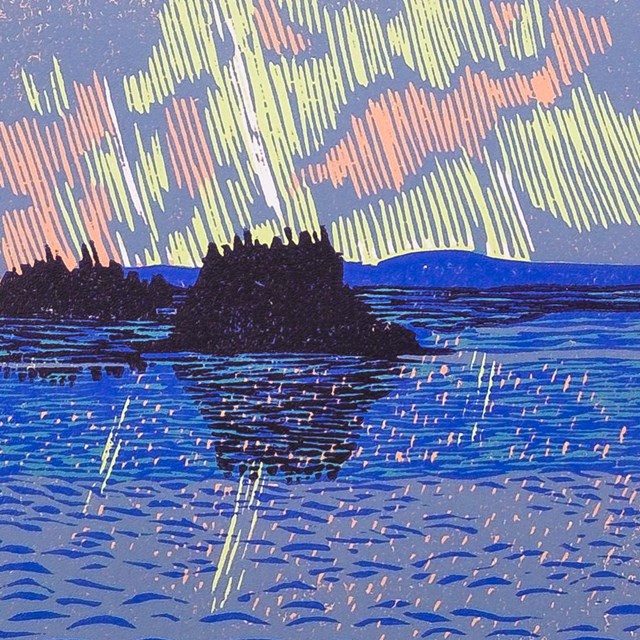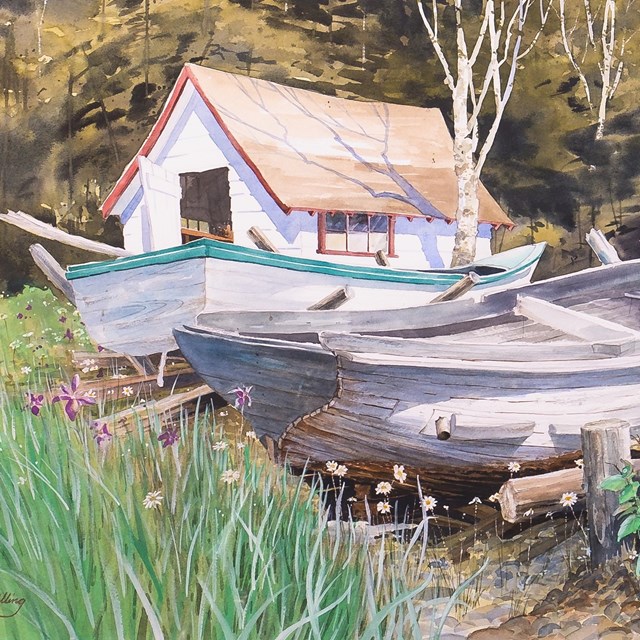|
Red Dragonfly Press / 2007 —for Dick and Mary Scheibe Lakeshine: I’d say
tinfoil, the first easy thing to say, shielding my eyes to dock or cove. I’d say lightshow on steroids or little electric shocks or fireflies transfigured. Here the eye takes the brain walking. The brain on its leash has no human speech for this expanse, the usual amazing— oh, it widens. Do you believe it? falls ping! on searing metal that blinds. Or it loosens. My heart, its breathing hole
at my ear. My head empties and fills with it. Like I heard something in that quiet, heard the fox, then saw the fox out there, young, too early from the den. Was he in danger? I don’t know. It was lake light, not an ocean though water came and went, grew large, the fox probably never sweet but tentative near the rocks, not quite, not stopping either. Breathe. I breathe like that. And gave him fear. And made him vast. The loon with two chicks.
No. Two loons with two chicks equals four. Really three, he told me. One chick survives. For now, it’s daylight and glare. And water run. To dip a hand from the boat, a semi-sweet stinging. The air’s cut through thousands of spruce to get here and smell like this. How to know the woods is straight violence and sex, that anything can walk off a postcard into ruin, that wolves track an old moose five at a time. The bloody at it comes quick. Like the silkworm, is it
spit the spider leaves behind? Loose tangle of squares and circles so moth and fly go stupid to pass through or rest on a thread. Not yet, either one, though wind billows the doorway. She does a little repair, down, sideways. A hunger so elaborate is casual now. Nothing to it but the rising and the falling. Let’s review the fog suit
for each island, the voice leaked from somewhere to tell her. See, you can’t know if it descends to or rises from water, even the spruce bleached out. Close or far, it’s not that pretty. Step out of the fog suit for the poem. Please. Put on something else. But I love the fog suit, she said, rocks eaten by it, minnows and big honkin’ trout, shipwrecks stinking up in the bay blanked out, guys who thought they were fishing. Hear it? They’ve cut the motor in that nothing. Only two or three words they repeat. Then slowly repeat. And not to each other. They’ve made the old fishery
an old fishery again, real trout in a waterbox under the floorboard you lift by an iron ring. Look. One’s huge. And doesn’t even bother to circle as the smaller ones circle. Their fate is anyone’s fate. Two choices: you can wait in that dark or up here. Meanwhile, flowers riot in their window and roses come hither, hither, almost indecent, then truly. This lost or never at all. Held in that fragrance. Past sixty and pounds over, she
jumped from the boat, suddenly bigger than her life. Perhaps you were her sister shocked, who turned away. Because she stripped off everything, descending— a goddess, no, a god—in that bright lagoon where shade made deeper pools, lake a further noise past those islands. The truth is, massive and pale, she lengthened and swam, maybe singing out Something. And why not? I see water so clear in this story, the grace to do that, the perfect nerve of any summer afternoon marked by abandon, years and years released like a latch: light and leaves, remember? Too much and so many. Nothing doing, none of it painted, she said.
A house of wood that says wood, knots in the grain where a branch had hope afloat in each board, windows cut into wall. A wall? the voice said, you mean a thing nailed up, hammer hitting square or not? And I want water in the poem, she said, seen from a porch. Or its blue could be closer. A pond. An inland lake. Smallest color on a stamp where no roads can be built. And fish fish fish? the voice throwing its voice sounded funny, like a mouse, a little bird: just the thought of their flashing… Don’t make fun of me, she said. They come flush with some larger world. And I’ll forget you. Not gracious but hair the wren
weaves into nests is still an offering, the human head a curious instrument of giving and use up and get back. Or hair once crisscrossed into plaster even now stiffens a wall. The old days. I told you, that island darks any winter you want, but more—hurry—one needs it long. I read he died. She grew weak alone, iced in out there. No story at all if not for the rabbit snares she made with her hair. And watched in snow, each month adrift. Delicate, and hopeless it must have, must have as she knotted and wove, each next one to make it stinging up from the root. They collect skulls and go by boat,
knowledge an island, after all. They circle it. You can tell anything by bone in the head. Press this, he says. It’s thinning. This moose lived a long time. And this one, the carcass found by wolves that might have starved, snow two feet deep. When and how—someone marked exact, in ink. So this village of skulls has heroes. The cedar’s enormous throwing its shade. Bone where brain kept storm and sky. Lake dizzied in there. That ache, that dotted line between us? Their holes stare anyway. One island is
a dragon. One’s a giant at rest. See his profile, she says, hands on his chest? Then it’s years. And she stops. The silence out here, its where and once, its ghost and its oar. Who wouldn’t lie back and go under? Water equals dream, dream equals any small boat come this far. And summer. Who can keep childhood from it? You throw a rope to someone who waited on shore. The lake, clouds patch it dark.
And below, trout only want it calm, no eels to sucker them down or scar them, no hooks tied with feather. It’s not what you want, the voice said. And what the moose wants?—not to be riddle-stung by ticks, blood gluttons swollen half an inch by late winter. And what the wolf wants— guess. Those ravens circle his kill, birds that will and want some and already have. It’s not the poem you want, the voice rang in her ear. As if you even could—the finally, the never finished in all this. 135 copies printed from hand-set Deepdene and
American Uncial types. The text paper is Frank- furt Cream and the handmade wraps are from the Twinrocker mill. The title page illustration — ‘Wolf-kill relics from Isle Royale’ — is from the hand of Gendron Jensen. Copyright 2007 by Marianne Boruch ISBN: 978-1-890193-75-1 ‘Let’s review the fog suit’; ‘Like the silkworm, is it’; ‘Nothing doing, none of it painted, she said’; ‘One island is’ Great River Review. ‘My heart, its breathing hole’; ‘The lake, clouds patch it dark’ Meridian. ‘Lakeshine: I’d say’; ‘They collect skulls and go by boat’ Pank. ‘They’ve made the old fishery’; ‘Not gracious but hair the wren’; ‘Past sixty and pounds over, she’; ‘The loon with two chicks’ Quarterly West. Many thanks to the editors of the above journals who took on this work. And to Rangers Greg Blust and Karena Schmidt for their great kindness during my time in the Artist-in-Residence Program at Isle Royale National Park where these poems were written, July 2006.
|
Last updated: January 15, 2020



